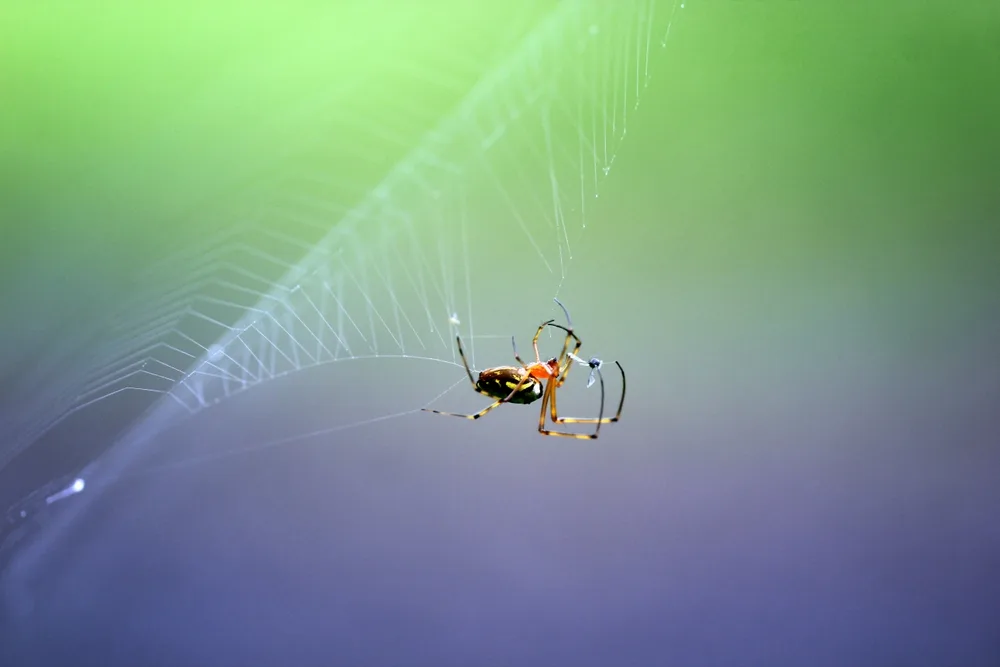
Noticed more spiders in your home lately? You’re not alone. Many people see these eight-legged guests more often than they’d like.
While most house spiders like the American house spider or cellar spider are harmless, they can be quite a nuisance with their webs. There are also more intimidating spiders like wolf spiders that you might come across.
Why Are Spiders in Your Home?
Spiders typically come indoors for two reasons: shelter and food. They often find their way inside when the weather gets extreme, especially in colder months when your warm home is inviting. To keep spiders at bay, you need to address the reasons why they’re coming in.
Keeping Your Lights Off
Leaving lights on at night can attract spiders. Bright lights draw flying insects, and where there are bugs, spiders follow.
To reduce this attraction, use motion sensor lights outside to limit the time lights are on. Inside, close your blinds or curtains at night to minimize light spill.
Switching to yellow sodium vapor lights outdoors can also help, as these are less attractive to insects. Regularly clean around light fixtures to prevent spiders from setting up webs.
Controlling Insects
Your spider problem may actually be an insect problem. Spiders are attracted to places with lots of insects like flies and mosquitoes.
To tackle this, start by managing insects. Clean your drains to get rid of drain flies using a mix of vinegar and baking soda followed by boiling water.
Keep windows and doors closed or screened and ensure your home is clean, especially from food crumbs.
Remove standing water from plant saucers and buckets as it attracts mosquitoes. If you have a severe insect problem, consider professional pest control to reduce the insect population, which will also reduce spiders.
Managing Indoor Plants
Indoor plants can attract insects, which in turn attract spiders. Overwatered plants create a moist environment that insects love.
Water plants just enough and empty saucers under pots to avoid standing water. Regularly check for pests like aphids and mites, and use natural insecticides if needed.
Consider placing plants away from windows and doors to prevent insects from entering your home through these plants.
Addressing Moisture Issues
Spiders need moisture to survive, and damp areas are attractive to them. Fix any leaks in plumbing, roofs, or basements to prevent moisture buildup.
Use dehumidifiers in areas prone to humidity, like basements and bathrooms. Check for and seal any cracks around your home that might let in moisture or spiders.
Keep gutters and downspouts clear to direct water away from your home, and ensure plants are positioned away from the foundation.
Cleaning Your Yard
A messy yard can attract insects and spiders. Regularly mow your lawn and trim bushes. Clear away piles of leaves, wood, or grass clippings, and keep trash cans tightly sealed.
Clean outdoor furniture and decorations to prevent spiders from hiding. Move storage bins occasionally to avoid spider habitats.
Sealing Cracks and Openings
Spiders can enter through unsealed cracks around windows, doors, and utility pipes. Seal smaller gaps with caulk and larger ones with appropriate sealants.
Install a door on your fireplace if you don’t use it regularly to keep spiders out. Use the oldest firewood first to prevent spiders from settling in wood piles.
Managing Food and Clutter
Leaving food out can attract ants and other pests, which in turn attract spiders. Store food in airtight containers and clean up crumbs promptly.
Check fruit and vegetable storage to avoid attracting fruit flies. Clean spills immediately and take out the trash regularly.
Using Screens
Screens on windows and doors are essential for keeping insects out. Choose standard or fine mesh screens based on the size of insects in your area.
Check screens for damage and repair any tears immediately.
Decluttering Your Home
Cluttered spaces, especially attics, basements, and garages, are ideal for spiders. Keep these areas tidy and vacuum regularly.
Store items off the floor and use shelves and cabinets for organization. Seal bags or boxes for infrequently used items.
